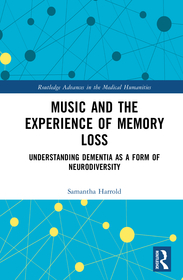
Music and the Experience of Memory Loss
Understanding Dementia as a Form of Neurodiversity
Sorozatcím: Routledge Advances in the Medical Humanities;
-
20% KEDVEZMÉNY?
- A kedvezmény csak az 'Értesítés a kedvenc témákról' hírlevelünk címzettjeinek rendeléseire érvényes.
- Kiadói listaár GBP 145.00
-
69 273 Ft (65 975 Ft + 5% áfa)
Az ár azért becsült, mert a rendelés pillanatában nem lehet pontosan tudni, hogy a beérkezéskor milyen lesz a forint árfolyama az adott termék eredeti devizájához képest. Ha a forint romlana, kissé többet, ha javulna, kissé kevesebbet kell majd fizetnie.
- Kedvezmény(ek) 20% (cc. 13 855 Ft off)
- Kedvezményes ár 55 419 Ft (52 780 Ft + 5% áfa)
Iratkozzon fel most és részesüljön kedvezőbb árainkból!
Feliratkozom
69 273 Ft

Beszerezhetőség
Becsült beszerzési idő: A Prosperónál jelenleg nincsen raktáron, de a kiadónál igen. Beszerzés kb. 3-5 hét..
A Prosperónál jelenleg nincsen raktáron.
Why don't you give exact delivery time?
A beszerzés időigényét az eddigi tapasztalatokra alapozva adjuk meg. Azért becsült, mert a terméket külföldről hozzuk be, így a kiadó kiszolgálásának pillanatnyi gyorsaságától is függ. A megadottnál gyorsabb és lassabb szállítás is elképzelhető, de mindent megteszünk, hogy Ön a lehető leghamarabb jusson hozzá a termékhez.
A termék adatai:
- Kiadás sorszáma 1
- Kiadó Routledge
- Megjelenés dátuma 2025. szeptember 15.
- ISBN 9781041072652
- Kötéstípus Keménykötés
- Terjedelem174 oldal
- Méret 234x156 mm
- Súly 480 g
- Nyelv angol
- Illusztrációk 5 Illustrations, black & white; 5 Line drawings, black & white; 3 Tables, black & white 696
Kategóriák
Rövid leírás:
This book is a creative and critical exploration of the memory loss experience. Drawing on in-depth case studies based on primary research, interviews, approaches from music therapy, and theory from Derrida, Malabou and Royle, it explores how we might better support people living with memory loss.
TöbbHosszú leírás:
This book is a creative and critical exploration of the memory loss experience. Drawing on in-depth case studies based on primary research, interviews, approaches from music therapy, and theory from Derrida, Malabou, and Royle, it explores how we might better support people living with memory loss.
Telling the story of an interpretative phenomenological analysis investigation, this innovative book focuses on conversations with ten people living with memory loss in a nursing home, alongside interviews with the pioneering dementia campaigner Wendy Mitchell. The author argues that, for residents who are living with memory loss, both the nursing home environment and the memory loss experience are uncanny. She considers how archival impulses may manifest themselves at the end of life, before exploring theories of both artistic plasticity and neuroplasticity, proposing that the memory loss state might be thought of as a kind of neurodiversity. The book concludes with suggestions for future methods that alleviate disorientation for people living with memory loss and help with acceptance, the reduction of stress, and better outcomes across multiple disciplines and practices, including music therapy, community musicianship, and the nursing home environment itself.
A better understanding of how it feels to live with memory loss is necessary for the development and improvement of practices that are designed to help the memory loss community. This book is an invaluable contribution to research around memory loss, for scholars and practitioners interested in medical humanities, dementia, social care nursing, occupational therapy, and music therapy, among others.
TöbbTartalomjegyzék:
1. Introduction, 2. Sacks, Mitchell, and the question of value, 3. Five strange stories, 4. The uncanny, the archive and the plastic brain, 5. An alternate way of being and implications for future practice
Több



